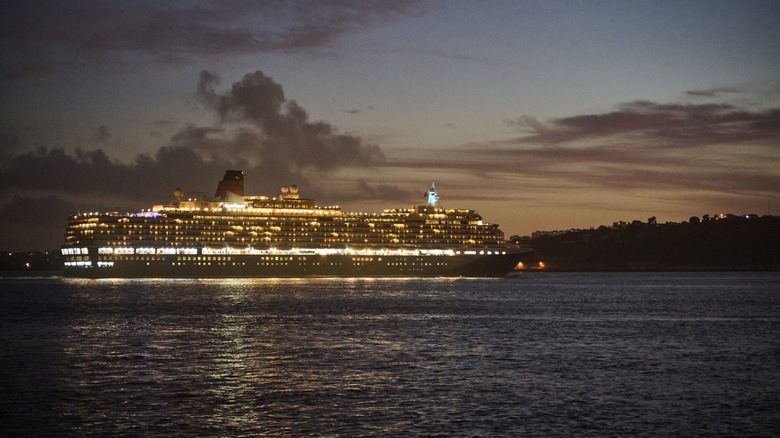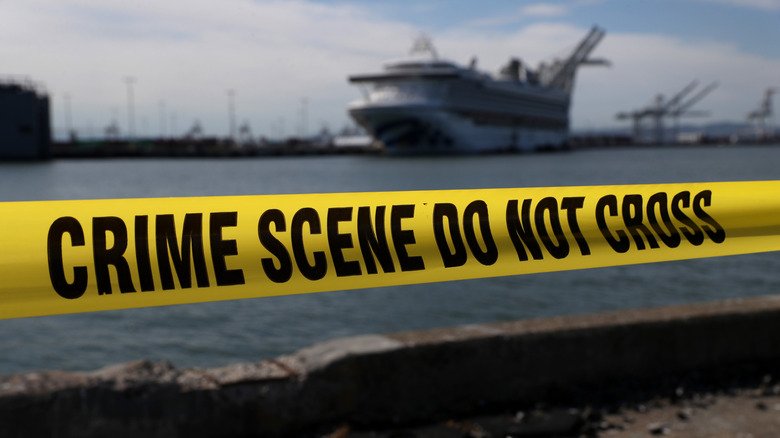How Many Passengers Die On Cruise Ships On Average? Here's What Travelers Should Know
When bad things happen on cruise ships, people tend to remember. Many still get chills thinking about the terrorist hijacking of the Achille Lauro in 1985. We struggle to imagine getting stranded on a quarantined cruise ship, like the passengers on the Diamond Princess in 2020. The 2013 power and plumbing failure on the Carnival Sunrise — the so-called "poop cruise" — was made into a Netflix documentary, as was the saga of Amy Bradley, who famously disappeared from a cruise ship in 1998. These nightmare scenarios extend into fiction as well: "The Poseidon Adventure," a thriller film about a passenger ship that capsizes, was made in 1972 and remade in 2006. If we only saw these sensational stories, we'd think cruise ships were inevitable death-traps.
These kinds of disasters are extremely rare, of course, and the vast majority of cruisers have a wonderful time. At worst, passengers may have to deal with inclement weather or unexpected illness. Cruise ships are designed for pleasure, and a whole army of crew members are devoted to passenger service and safety. From lifeboats and floatation devices to security personnel and 24-hour emergency medical care, cruise ships are equipped to handle a wide range of situations. As for the "Poseidon" premise, here's why you shouldn't worry about your cruise ship tipping over on your next voyage.
But accidents do happen, and cruising has inherent dangers. This begs the question: How many people actually die on cruise ships? For people who ignore the things you should never do on a cruise — or simply have bad luck — how many of these situations prove fatal? In short, nobody knows exactly. If cruise lines keep precise statistics, those numbers aren't public and no comprehensive studies have been published. Speculating leads to other questions as well.
Cruise ships and the inevitable death at sea
To provide a good answer, we would have to know what qualifies: What does it mean to die "on a cruise"? What if someone had a heart attack on the way to the embarkation point? What if the cruiser was taking a taxi in a port-of-call and collided with another car? Does the passenger have to be standing aboard the ship itself, or could the death take place on an organized tour? How about passengers who were "lost at sea"? One of the most harrowing stories was that of Amy Bradley, who disappeared from a cruise ship in 1998 and recently inspired the Netflix documentary. Her status and whereabouts are completely unknown, but her death has never been confirmed.
Meanwhile, not all fatalities carry equal weight. It's no secret that cruise ship passengers tend to skew older, and with age comes a variety of common health concerns. Cardiac issues, allergic reactions, and bad falls could happen anywhere, and cruise companies make every effort to prevent these tragedies from happening. The events that make headlines tend to be freak accidents or encounters: In June of 2025, a crewman aboard a Royal Caribbean ship stabbed a fellow staff member, then jumped off the ship into the ocean, where he drowned. A month earlier, a 60-year-old man died on the MSC Virtuosa — shortly after getting into a fight with another passenger. The circumstances were suspicious enough to warrant an arrest. These kinds of melodramas spark global interest, but they're not exactly standard behavior.
What we do know is that 34.6 million people took cruises in 2024, and the vast majority of them survived. While things could always go wrong, the odds of dying on a luxury vessel are extremely low. And without much effort, you can push those odds near to zero.
How to stay safe on a cruise ship
Staying safe on a cruise ship generally boils down to following the rules and using common sense. Bring along any medications or aids that you need; avoid parts of the ship that are off-limits. Pay attention during the ship's muster drill, so you know what to do in case of a major emergency. Treat others with respect and avoid confrontations with guests and crew. If you bring children, make sure they are supervised at all times. Cruise ship passengers do occasionally fall overboard, but it's not exactly an easy mistake to make.
Ironically, one of the most dangerous things you can do on a ship is one of the major reasons people take cruises in the first place: drinking too much. It's very easy to access alcohol on a cruise ship, and this can lead to all kinds of poor decisions and misadventures. According to the website Cruiseline, a typical cruise ship passenger consumes an average of 4.7 drinks per day at sea. This kind of trip is designed to help people kick back and relax, but this can be bad news for people who struggle with impulse control. Exercising a little moderation won't exactly kill us.


